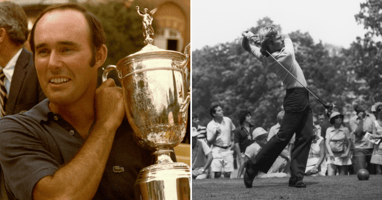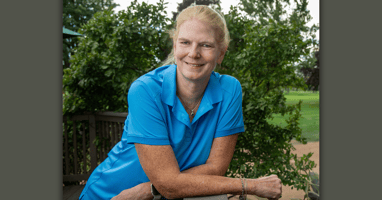A look back from an esteemed golf writer who covered it Photographs courtesy of USGA This article...
July 2024 - Who Was She to Know?
First American female Olympic champion was a Chicago golfer who never received a medal
Artwork created using USGA Photography
This article appeared in the July 2024 edition of Chicago District Golfer.
To read more Chicago District Golfer stories, head to our article archive.

The women's golf event at the 1900 Olympics consisted of nine holes that ranged in distance from 68-230 yards. It was won by then-22-year-old Margaret Abbott, a member of Chicago Golf Club who would earn the distinction of being the first American woman to win a gold medal.
What if we told you that the first American woman to win a gold medal in the Olympics was a golfer who learned the game at Chicago Golf Club in Wheaton?
What if we told you that the winner never realized during her lifetime that she won an early version of what would become a gold medal and held the distinction of being the first woman from the U.S. to become an Olympic champion?
What if we also told you the research of a University of Florida professor, who initially had her interest piqued by seeing the winner’s name misspelled on a plaque, finally put together all the pieces to give the golfer her rightful place in Olympic history more than 80 years after her achievement?
Meet Margaret Abbott and her unlikely tale of being a history-making Olympic gold medalist.
“It seems incredible to me that an Olympic champion could live her entire life completely unaware of her seminal athletic accomplishments,” said John Moran, a member and club historian at Chicago Golf. “And as an amateur historian, it also seems incredible to me that it's only because of a diligent professional researcher, who found the story 80 years after the fact, that any of us knows the story at all.”
Indeed, the 2024 Olympic Summer Games in Paris provide the perfect backdrop to recount what Abbott did, along with her Chicago connection, 124 years ago during the first Olympics held in the French city in 1900.
Since every blade of grass seems to ooze history at Chicago Golf, the first 18-hole course in the U.S., it really shouldn’t come as a surprise that the club has some Olympic lore with Abbott. During the 1890s, Abbott was a wealthy young socialite who, along with her mother Mary, spent summers in Wheaton. She was introduced to golf by none other than Chicago Golf founder and architect, Charles Blair Macdonald, one of the most influential individuals in golf history. She also was tutored at the club by James and David Foulis, who, like Macdonald, are members of the Illinois Golf Hall of Fame.
“She learned from some of the best players (of that era),” Moran said. “She quickly went from being a beginner to playing at scratch.”
In 1899, Abbott joined her mother in Paris, where she studied art alongside Auguste Rodin and Edgar Degas. After reading about a golf tournament in the local newspaper, both mother and daughter decided to sign up to play in the Prix de la ville de Compiègne, a competition held about 50 miles north of Paris at the Compiègne Golf Club, on Oct. 4, 1900.
Back then, the Olympics weren’t the grand spectacle they are today. In fact, those were only the second iteration of the modern Games; the first was in Athens in 1896. The Olympics were more of a sideshow to the World’s Fair being held in Paris.
 Abbott was introduced to golf by Charles Blair Macdonald, founder and architect of Chicago Golf Club.
Abbott was introduced to golf by Charles Blair Macdonald, founder and architect of Chicago Golf Club.
The women’s event consisted of just nine holes that ranged in distance from 68 to 230 yards. Abbott, who was 22, shot 47 to beat a field of 10 women that also included her mother, who finished seventh. The Abbotts made history in another way, as they were the first, and still only, mother and daughter to compete in the same event at the same Olympic Games.
Abbott, though, did not receive a gold medal. Most of the winners in Paris were presented with historical artifacts; Abbott was given a porcelain bowl embellished with gold for her triumph.
Abbott was happy to win, but she did not get too excited about it. She would later write to her relatives back in America that she had won an “exhibition.” Her relatives did not recall her talking much about the victory during her life.
Abbott eventually moved to New York where she married noted columnist Finley Peter Dunne. She had four children and due to a knee ailment never competed seriously in golf after the 1900 Olympics.
Abbott died in 1955, completely unaware of the scope of her achievement in Paris. She likely would have remained in obscurity if not for Dr. Paula Welch.
Welch, a professor at the University of Florida, had a strong interest in Olympic history. During a visit to the U.S. Olympic Committee headquarters in 1973, she noticed a plaque bearing the names of all American champions. She saw Abbott’s name on the list, and it was misspelled as “Abbot.”
Welch, who never had heard of Abbott and her victory, wanted to learn more about her. Her research continued on and off for a decade.
“I just felt like this was such an interesting story,” Welch said. “I wanted to find out as much as I could.”
Welch eventually pieced everything together and in the early 1980s, she called Abbott’s son, Philip Dunne, and informed him of the history made by his mother.
In a first-person story in Golf Digest in 1984, Dunne wrote: “It’s not every day that you learn your mother was an Olympic champion, 80-odd years after the fact. The champion herself had told us only that she had won the golf championship of Paris.”
The discovery also was celebrated by Chicago Golf Club. It takes great pride in its connection with Abbott. Last fall, Abbott was inducted into the Illinois Golf Hall of Fame. Moran accepted on her behalf.
In his acceptance speech, Moran called her, “Our Olympic champion.”
Abbott only spent a few years at the club, but Moran said, “for the rest of her life she played the kind of golf she learned at Chicago Golf Club.” l
A former Chicago Tribune golf writer, Ed Sherman is a frequent contributor to Chicago District Golfer.
 Kathryn Belanger, USGA
Kathryn Belanger, USGA
From St. Charles to Paris
The International Olympic Committee (IOC) estimates that 10,500 athletes will take part in the Summer Olympic Games in Paris later this summer. For each one of those athletes, there will be an exponential number of support staff and volunteers needed in order to make the Olympic Games the world’s largest sporting spectacle.
One of those vital behind-the-scenes individuals will be St. Charles native Kathryn Belanger. The 32-year-old is the USGA’s director of rules and championships and will be serving as a rules official for the women’s golf competition, scheduled for Aug. 7-10 at Le Golf National.
“I am very, very excited to get to work the Olympics,” Belanger said. “It definitely feels like a bucket list item.”
Belanger’s path to Paris began as a west-suburban 7-year-old, when her father, an avid golfer, introduced her to the game. She played four years at St. Charles East High School and then three years at Division III Loras College in Dubuque, Iowa, where she studied sport management and business.
A 2013 summer internship at the Illinois Junior Golf Association (IJGA), based out of Midwest Golf House in Lemont, while home for the summer made Belanger aware of the career opportunities available in golf.
“That opened my eyes to golf administration,” Belanger said. “That you could work for a golf association, a PGA section, just all of these different possibilities.”
Upon graduating one year later, Belanger submitted numerous applications throughout the golf industry. She eventually landed a position with the USGA as a rules associate, where she fielded Rules inquiries from golfers throughout the world. She has expanded her role with the USGA significantly in the ensuing decade, including serving as the on-air Rules commentator during NBC’s coverage of the U.S. Women’s Open.
“[The rules analyst position] was my crash course into the Rules of Golf,” Belanger said. “I fell in love with it and have been fortunate enough to get to continue on with the USGA ever since.”
Paris will mark 124 years since women’s golf debuted at the Olympics (see main story), but just the fifth time that it has been contested, following a lengthy hiatus. Belanger sees the value in golf being present on the largest sporting stage in the world and highly anticipates being part of the international spectacle that are the Olympic Games.
“It’s really special and unique, because the Olympics just takes on a broader role than week-in and week-out golf does,” Belanger said. “People who maybe aren’t golf fans specifically, but are sports fans, they’re tuning into the Olympics just because it’s the Olympics. It happens every four years and they want to hear the stories of these athletes competing. It definitely is a unique and a great opportunity to get golf to an audience that isn’t watching every week.”
—Casey Richards





